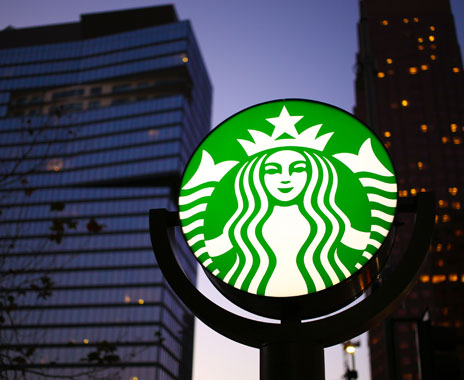Starbucks has a response to reports that its brand is faltering: It’s simply not true.
YouGov BrandIndex recently stated that consumer perception levels for the coffee giant dropped by two-thirds since late January. The culprit is believed to be the company’s announcement that it would hire 10,000 refugees at all locations worldwide. This resulted in a threatened boycott from President Donald Trump supporters fueled through social media. Starbucks responded by accelerating its prior goal of hiring 10,000 veterans and military spouses by 2018, a plan that was first unveiled in 2013.
Analysts at Credit Suisse also suggested a hold rating on Starbucks, saying that a drop in brand sentiment could impact short-term sales, and also noting that shares of Starbucks were flat since the announcement.
On Friday, Starbucks didn’t backtrack in any way; it simply set out to prove that the concern was overblown. The company shared a letter from Kantar Millward Brown, a leading multinational market research firm. The letter, sent to Starbucks chief strategy officer Matt Ryan, refutes the reports.
“Over the past week, there has been misinformation widely disseminated in the market about our brand, and stakeholders need the facts,” Ryan says in the statement. “The following note came from the president of Kantar Millward Brown—our long-term partner in providing brand and consumer equity research—clarifying current Starbucks brand perception. Reports suggesting anything other than this should be viewed skeptically and do not reflect the customer satisfaction and perception trends we are seeing so far in 2017.”
Here is what the letter said: “Kantar Millward Brown has provided continuous Brand Equity measurement for Starbucks since 2013. Following the recent release of results from a YouGov Brand Index Survey, several news organizations have reported that Starbucks is suffering from consumer backlash related to its announcement to hire 10,000 refugees globally over the next five years. Such backlash or declines are not substantiated in our own measurement of Starbucks Brand Health and Consumer Sentiment. Kantar Millward Brown has conducted on-going monthly measurement of Starbucks Brand Perceptions and Consumer Sentiment toward the Brand and saw no such impact in February 2017. In fact, in February 2017—after the announcement—we did not observe any substantive impact on Customer Consideration, Future Visitation Intent or Brand Perceptions or any other key performance metrics for the Starbucks brand.”
Starbucks, of course, has weathered social controversy in the past. In 2015, the “red cup” incident negatively hurt the brand’s perception but didn’t affect purchase consideration scores. YouGov, in an article on Reuters, seems to think this current situation could be different. They told Reuters that the refugee announcement resulted in a 6 percent drop (from 30 to 24) in consumer’s desire to pick Starbucks the next time they purchased coffee. The difference being that boycott supporters are, in theory, likely to influence their local network to shop elsewhere.
Whether this has any basis in reality remains to be seen. In the interim, Starbucks is searching for ways to reverse a traffic setback it credits to increased mobile orders. Sales, though, seem to be just fine. The company’s Q4 of fiscal 2016 was the most profitable quarter of its most profitable year in more than 24 as a public company. There was a 6 percent increase in average ticket and a U.S. comparable store sales boost of 4 percent.
By Danny Klein


